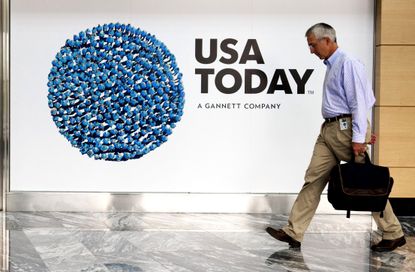A vulture swoops down on Gannett
The smartest insight and analysis, from all perspectives, rounded up from around the web:

The smartest insight and analysis, from all perspectives, rounded up from around the web:
The Gannett chain was the most voracious acquirer of local papers in the news business, said Brooke Sutherland at Bloomberg. Now "the hunter has become the hunted." The hedge fund Alden Global Capital this week offered $1.4 billion to buy Gannett, which publishes USA Today and dozens of other daily papers across the country, including The Arizona Republic, the Milwaukee Journal Sentinel, and The Cincinnati Enquirer. Alden's subsidiary, Digital First Media, already has a growing roster of papers — including The Denver Post and The Orange County Register — and a notorious record of decimating newsrooms. Alden believes that "the future of newspapers lies in consolidation and the cost cuts that it enables." That strategy of buying and cutting is exactly the one that Gannett pursued as it grew into the biggest newspaper owner in the country. Alden is following Gannett's own logic, taken to its furthest extreme. So far, wherever Digital First has gone, "a bevy of job cuts" has followed.
If Alden succeeds in its bid, it will be a waking nightmare for anyone who cares about newspapers, said Tim Grobaty at the Long Beach Post. A "vulture-capital scavenger firm," the hedge fund takes a simple approach: It acquires struggling papers and "wrenches every last suffering dollar out of them through layoffs and cutbacks until all that's left is a ghost of a newspaper that once faithfully covered its community's politics, schools, sports, and events." It has done so in California, where the once proud San Jose Mercury News is a shadow of its former self, and in Denver, where Digital First's newsroom bloodletting at the Post led to a staff uprising last April. The potential deal "stoked fears that an industry already reeling from years of cutbacks could be in for even more severe cost-cutting as financial owners become bigger players," said Keach Hagey and Lukas Alpert at The Wall Street Journal. In a time of flux in the news business, "financial companies, private equity, and hedge funds have gotten in on the action aggressively," and now own or manage four of the nation's 10 largest newspaper chains.
Subscribe to The Week
Escape your echo chamber. Get the facts behind the news, plus analysis from multiple perspectives.

Sign up for The Week's Free Newsletters
From our morning news briefing to a weekly Good News Newsletter, get the best of The Week delivered directly to your inbox.
From our morning news briefing to a weekly Good News Newsletter, get the best of The Week delivered directly to your inbox.
"If Digital First and Alden Global get their hands on Gannett, they will do what they always do: cut till it bleeds, and then cut some more," said Joe Nocera at Bloomberg. There's an irony here, because Gannett itself "was never afraid to cut costs." But it was "always mindful that it was in the journalism business." In 2018, three of Gannett's journalists even won Pulitzer Prizes, a coup for a company whose journalism was often disdained. Alden couldn't care less about Pulitzer Prizes. What it cares about is making "cuts deep enough to ensure profits." The hedge fund is "unusually naked in its strategy of extraction," said Ken Doctor at Nieman Lab, "investing as little as possible in the business as it harvests some of the highest profits in the industry." Two years ago, it would have been unthinkable that the giant Gannett would be up for grabs, but "all bets on the conventional wisdom of newspaper ownership are off." Newspapers are in a state of "unending downturn," with hedge funds and billionaires circling a shrinking industry in which "anyone with dollars and the appetite" can buy up the business.
Sign up for Today's Best Articles in your inbox
A free daily email with the biggest news stories of the day – and the best features from TheWeek.com
Create an account with the same email registered to your subscription to unlock access.
-
 India elections start amid violence, hate speech accusations
India elections start amid violence, hate speech accusationsTalking Points Narendra Modi seeks a third term while critics worry about the future of the country's democracy
By Joel Mathis, The Week US Published
-
 'Biden is smart to keep the border-security pressure on'
'Biden is smart to keep the border-security pressure on'Instant Opinion Opinion, comment and editorials of the day
By Harold Maass, The Week US Published
-
 Bird flu worries mount as virus found in milk, cows
Bird flu worries mount as virus found in milk, cowsSpeed Read The FDA found traces of the virus in pasteurized grocery store milk
By Peter Weber, The Week US Published